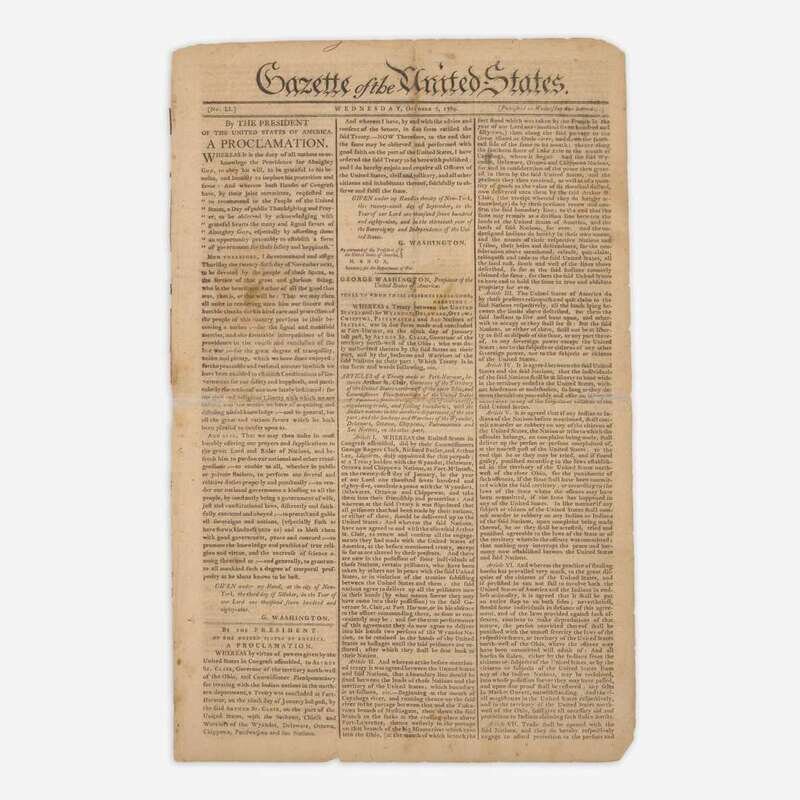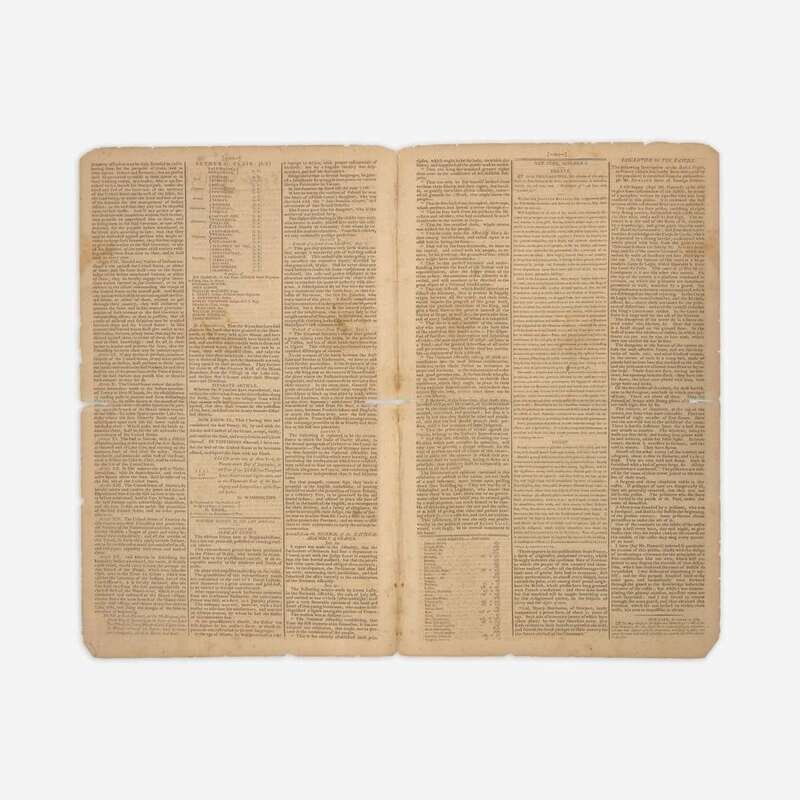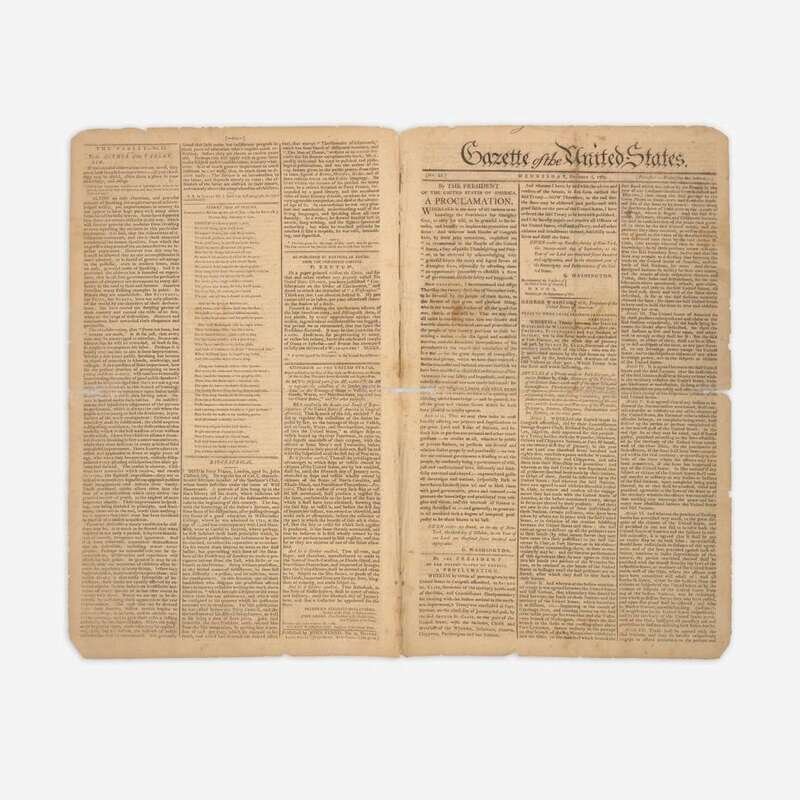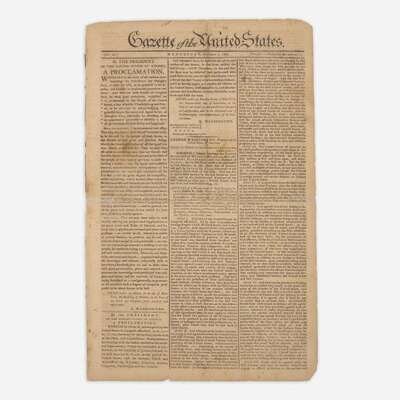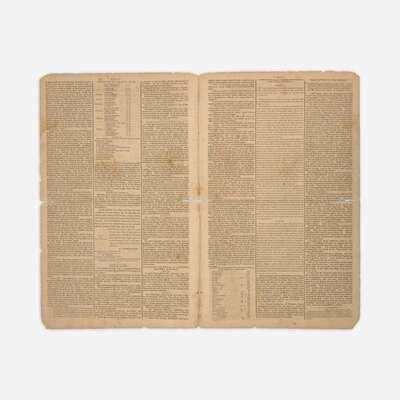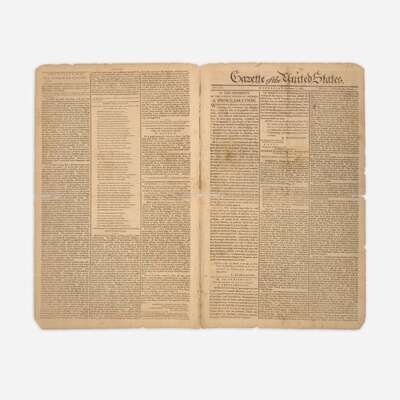Condition Report
Contact Information
Lot 17
Lot Description
George Washington’s First Presidential Thanksgiving Proclamation: A Rare First Newspaper Printing
“For the peaceable and rational manner, in which we have been enabled to establish constitutions of government for our safety and happiness, and particularly the national one now lately instituted – for the civil and religious liberty with which we are blessed; and the means we have of acquiring and diffusing useful knowledge…"
“To the great Lord and Ruler of Nations…to render our national government a blessing to all the people, by constantly being a Government of wise, just, and constitutional laws, discreetly and faithfully executed and obeyed. –to protect and guide all Sovereigns and Nations (especially such as have shewn kindness unto us) and to bless them with good government, peace, and concord – To promote the knowledge and practice of true religion and virtue, and the encrease of science among them and us– and generally to grant unto all mankind such a degree of temporal prosperity as he alone knows to be best...”
(New York: John Fenno), Wednesday, October 7, 1789. No. LI.; pp. (201)-204. Disbound; creasing from contemporary folds, scattered sello-tape repairs to same; trimmed along top edge, with remnants of ownership signature; scattered wear to edges.
The first newspaper appearance of George Washington's first Thanksgiving Proclamation, marking the end of the first session of the First Federal Congress, and the beginnings of the national holiday.
On Friday, September 25, 1789, Congressman Elias Boudinot of New Jersey introduced a resolution to the House of Representatives calling on President Washington to recommend to the people of the United States a day of public thanksgiving in celebration of "affording them an opportunity peaceably to establish a Constitution of government for their safety and happiness." That Monday, September 28, 1789, the Senate added its assent to Boudinot's resolution, and--on that same day--passed the Bill of Rights before adjourning the first session of the First Congress. On the following Saturday, October 3, as he signed cover letters forwarding the proposed Bill of Rights to the states, Washington issued his first Thanksgiving Proclamation as president. The practice started much earlier in New England, and Washington himself had proclaimed a day of thanksgiving in December 1777, following victory over the British at Saratoga, but this was the first following the ratification of the Constitution. In the Proclamation Washington gives thanks for “tranquility, union, and plenty” and asks the Almighty to guide the new nation’s leaders and government. The Proclamation served as a unifying statement of national purpose, and celebrated two things: First, that the United States had emerged victorious from a long war with the world’s greatest military power, and second, the peaceful implementation of a new government designed to balance necessary powers with strong protections of individual rights.
The American public enthusiastically accepted Washington’s Proclamation, and newspapers across the country printed it in full. On November 26, citizens all over the nation celebrated, and churches used the occasion to solicit donations for the poor. Washington himself celebrated by attending a service at St. Paul's Cathedral in New York City and donated food and drink to prisoners in jail for debt.
The Gazette of the United States, the semi-official newspaper of the federal government, was the first newspaper in the United States to publish Washington's message, printed in full on the front page of this issue.
This October 7 issue of the Gazette is the first newspaper publication of this historic proclamation, and may also be the first publication overall. Childs & Swaine’s The Daily Advertiser published it on October 8, as did The New-York Daily Gazette and The New-York Journal and Weekly Register all published it the next day and others followed. Childs & Swaine also published a broadside, but post-dated their newspaper printing, which had a publication deadline to meet.
Six years later, in 1795, Washington issued his second and final Thanksgiving Proclamation following his successful suppression of the Whiskey Rebellion. John Adams and James Madison would also issue Thanksgiving Proclamations. Abraham Lincoln was the next president to issue national Thanksgiving Proclamations. Lincoln was moved by a letter from Sarah Josepha Hale, who had lobbied the four prior presidents unsuccessfully to make Thanksgiving a national holiday in addition to Independence Day and Washington’s Birthday. On October 3, 1863, exactly 74 years after George Washington’s First Proclamation, Lincoln established the fourth Thursday in November as a national day of Thanksgiving, setting an enduring precedent.
This issue also includes a printing of the Treaty of Fort Harmar between the United States and the Wyandot, Delaware, Ottawa, Chippewa, Pattawatima, and Sac Indian nations (p.1-2). A report from London about an “African Genius” (p. 2). And a report on the proceedings of Congress, including an act to suspend part of the Tonnage Duties Act (p. 4).
